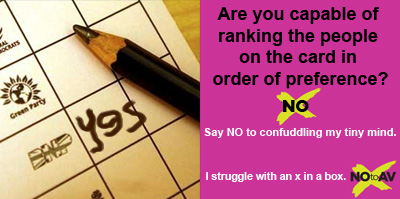Want an example? Let’s invent a seat called, say, West Borsetshire. It was held by the Tories for ages, taken by Labour in 1997, and recaptured in 2010. There is, however, a strong Lib Dem presence, so any of the three parties could theoretically win it.
Now, let’s assume (taking the minor parties out of the equation) that Tory and Labour voters would probably tend to put the Lib Dems as their second choice, and Lib Dem second preferences would divide a bit more evenly. As a Tory candidate, one of your main priorities, under AV, would be to make sure the Lib Dems finished third, so that you got enough of their votes to take you over 50 per cent. If Labour were eliminated first, and all their votes given to the Lib Dems, the chances of keeping your seat would be far lower.
You can change the specifics, and the names of the parties, but the point remains – under AV, the order in which the candidates are eliminated can matter hugely, to the extent of determining the result. That turns the ballot into a species of game theory, in which party strategists come up with freakishly complicated scenarios that could deliver victory.
To vote to create such an outcome would require a Conservative voter to vote Labour 1st, Con 2nd. This would then push Labour up the vote, knocking the LDs down. Of course, it could also mean that if enough Conservatives did likewise, then Labour would secure a majority.
Quite simply, this just isn't going to happen, and it's yet another bit of No2AV drivel.
The consequence – in Australia, at least – has been the emergence ofparty voting cards, in which your chosen party asks/instructs you to list your voting preferences in a particular order, to maximise its chances in that constituency. Under AV, such cards would almost certainly become a common sight in British campaigns – further increasing the sway of politicians over voters.You'd think he'd read the actual article he linked to. It says nothing about tactical voting and everything about preference voting. In other words, Big Party A cuts a deal with Small Party B that Small Party B asks its voters to put B first, A second, they'll give them something in return. It's about saying "these guys are a bit like us" to their followers. It has no effect whatsoever on tactical voting and certainly doesn't fit Colville's dumb as a pile of rocks example.


